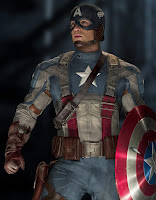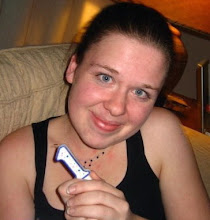We start by setting up arguably one of the better villains of the MCU, Loki (Tom Hiddleson), who is given a scepter with mind-control powers and sent to Earth to get the film's MacGuffin, the Tessaract. The blue cube, last seen in "Captain America: The First Avenger" was recovered by S.H.I.E.L.D. and is being experimented on by Dr. Erik Selvig (Stellan Skarsgård) from "Thor" for its unlimited energy potential. Soon, it bursts open, allowing Loki to arrive through a wormhole, and use his fancy schmancy scepter to take control of the minds of Selvig and Hawkeye (Jeremy Renner). It's a shame too, because Hawkeye barely gets any screen time before he's turned into one of Loki's lemmings.
The film jumps right into the action, with S.H.I.E.L.D.'s Nick Fury (Samuel L. Jackson), Maria Hill (Cobie Smulders) and Phil Coulson (Clark Gregg) chasing after Loki and his goons, who get away with the Tessaract. So it's time to call in the
Fury recruits Steve Rogers/Captain America (Chris Evans), who is spending his defrosted days destroying punching bags while trying to cope with the emotional and psychological toll dying/being frozen for 70 years takes on a person. The recap of his last conversation with Peggy is brutal. Meantime, Coulson is sent to the newly built Stark Tower, powered by an arc reactor, to recruit Iron Man. After Tony dismisses Pepper's contributions ("Give yourself 12% of the credit"), she leaves Tony to his 'homework' from Coulson, which includes studying up on his soon-to-be compatriots. There are probably lots of Easter Eggs here, but for the sake of time, I'll skip ahead.
 Coulson gets a brief moment to (semi-creepily) fangirl over Captain America -- bragging that he collects Cap trading cards. It's endearing to see him ask for his hero's autograph. The heroes arrive on S.H.I.E.L.D.'s helicarrier, where they are able to track Loki to Germany. He's there to steal some sort of mineral or whatever to help Selvig create a weapon/extended wormhole out of the Tessaract.
Coulson gets a brief moment to (semi-creepily) fangirl over Captain America -- bragging that he collects Cap trading cards. It's endearing to see him ask for his hero's autograph. The heroes arrive on S.H.I.E.L.D.'s helicarrier, where they are able to track Loki to Germany. He's there to steal some sort of mineral or whatever to help Selvig create a weapon/extended wormhole out of the Tessaract. It's almost impossible to take Hiddleson seriously in that ridiculous reindeer-antler helmet of his, as he tells the crowd that they were meant to be ruled. Cap, Stark and Natasha swoop in to save the day and arrest Loki, which, as our heroes point out, seems to easy.
With the Avengers (sans Hawkeye) assembled at least physically in the same space, Marvel shows us small cracks in the team -- pieces of their humanity that make them relatable. We also get some of the best one-liners here -- and this film is chock-full of them. This is the movie that truly marked Marvel's stamp on their signature quip. And it's not all coming from Stark. They play to each of the characters' personalities. Whether it's
Thor trying to reckon with his brother being the bad guy ("He's adopted") to Steve's lack of pop culture knowledge on account of being frozen for the last 70 years ("I understood that reference!") to Stark's sarcastic schmoozy nature ("That man is playing Galaga!"). The quips are all funny, but in their own ways -- like our soon-to-be rag-tag bunch of heroes.
Tony and Banner form a bit of a science-bro bond, but Ruffalo's Banner is more timid, mild mannered (at least when he's not green). He's just trying to keep his nose down and get his work done finding the Tessaract. Meantime, Tony is Tony, trying to figure out what Fury & S.H.I.E.L.D. are hiding. And also tries to provoke the Hulk out. Cap, being the good soldier that he is, has problems with Stark questioning orders. It's here that
you can begin to see the fracture and tension that would eventually lead to "Captain America: Civil War." Director Joss Whedon does a nice job of giving both Steve and Tony their own character moments to discover S.H.I.E.L.D.'s secret: Tony hacks the computers, Steve uses his WWII spy/soldier skills to find that they are trying to use the Tessaract to create weapons.
Meantime, Loki is barking misogynistic insults at Black Widow as she explains how Clint was sent to kill her, but decided to get her to join S.H.I.E.L.D. instead. It's a good moment where Loki thinks he's played her, but really, the master spy and assassin has been playing him the whole time. Just as our heroes are having a falling out over Cap & Tony's discovery, a brain-washed Clint attacks in an effort to coax the Hulk out. It works, although for some still inexplicable reason, Banner's shirt rips as he changes, but his pants remain intact.
This gives us another nice action set piece - with each of our characters getting time in the spotlight. First Black Widow, then Thor try to contain the Hulk (spoiler, it doesn't work) before the Hulk attacks a S.H.I.E.L.D. jet that shot at him and plummets to the ground. Cap and Tony work together to repair a helicarrier engine in a nice pivot from their argument
moments earlier. And Nat gives Clint the cognitive re-calibration he needs to get Loki out of his head. Speaking of, that trickster somehow pulls a fast one on Thor (again -- he's really too trusting), then kills Agent Coulson so he can escape. And to add insult to injury, Loki flings Thor from the helicarrier in the Hulk's cage. Whoever did the sound effects of the God of Thunder bouncing around in that thing should get an award.
Turns out Coulson's death is the rallying point our scattered heroes need to take on Loki, who is now headed to New York City (where else) to try and take over the world with his creepy Chitauri army. Thanks to the help of a brain-washed Selvig and the Tessaract, he's able to let them and their creepy metal slug things fly
through a giant worm hole in the sky. Tony really needs to up his security at Stark Towers if Loki and Selvig were able to get in without any trouble. Stark sarcastically, but forcefully tells Loki that he's pissed the wrong people off -- and "if we can't save the Earth, we'll be damn sure to avenge it." Loki's awfully confident ("I have an army") but so is Stark ("We have a Hulk.")
This sets up what I'll call a 'relay' fight scene -- with the action jumping from character to character as if they're passing off a baton. It's really done quite well, although upon re-watching this, I did notice how long the final battle scene is (30+ minutes). But we get some great quips from everyone and really get to see our heroes pull together as a team. Cap and Tony team up, so do Nat and Clint ("Just like
Budapest all over again!" "You and I have very different memories of Budapest.") Thor swoops in to confront is brother, saying that this is madness. Banner too shows up late to the party, but he makes the most of his screen time -- telling Cap his secret is he's always angry, before transforming into Hulk. Later, he gets to beat the literal shit out of Loki when the God of Mischief tries to tell him off ("Puny God!")
New York" not only give us our Stan Lee cameo, but also help set the table for several Marvel films down the road. The two scenes embedded in the credits (mid- and post-) fit Marvel's template for the time -- one that teases/sets up something for a future movie, and another that's just for grins. It's here where we get our first glimpse of Thanos, though he doesn't say anything, just smirks menacingly, and of course the classic shot of our heroes in a restaurant eating shwarma (a scene that was actually added because of an RDJ ad-lib after the battle scene).
It's hard to recapture the feeling you got when you first saw this movie, because at the time it was so different, so risky, so revolutionary. And yet, it still holds up several years later. It's also the first time Marvel really found their voice -- striking a solid balance between action and comedy while weaving together different personalities, egos and alter egos. This was also a rare Marvel film where the villain worked. Sure, Loki's motives were predictable (world domination), but he is an intricate and fascinating character and you got a good sense of his motivation.
RATING: ⭐⭐⭐⭐.5 / ⭐⭐⭐⭐⭐⭐






















































